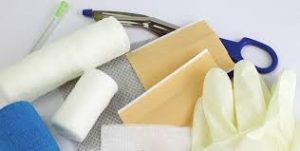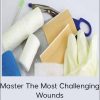Joan Junkin – Master The Most Challenging Wounds

Wound care has become increasingly complex! There are literally hundreds of wound care product and treatment options to be considered for patients. How can you feel confident that you are recommending the BEST option for the patient’s wound presentation?
Does this real patient scenario sound familiar…
Mrs. K is a 72-year-old female with chronic edema of both lower legs. She refused to use compression stockings, to later experience inflammation and weeping blisters. When Mrs K was admitted to the hospital for worsening heart failure, orders were given for TED stockings and Vaseline gauze to the blistered areas.
The provider wasn’t aware that those interventions were contraindicated. Would you feel confident to suggest a one-sided silicone mesh to protect the blistered areas instead? Or application of two layers of a compression sleeve, if her physician felt the return of fluid to her system would not worsen congestive heart failure symptoms? Or daily chlorhexidine soap wash to both lower legs to help prevent infection?
National wound care expert, Joan Junkin RN, MSN, will demonstrate best practice use of a variety of wound products and treatments, including monofilament pads for mechanical debridement of biofilm and slough, negative pressure disposable options and tools available to greatly simplify use of compression for lower extremity edema.
She will break down the very latest coming from research to support your own complex patient care decisions.
- Summarize products that provide antimicrobial protection for wounds without causing toxicity.
- Differentiate pros and cons of five methods of debridement.
- Appraise off-loading devices available for diabetic foot ulcers.
- Critique the tools available for easy application of compression stockings.
- Anticipate challenges for choosing appropriate solutions for an intact seal when using negative pressure wound therapy.
- Examine application techniques for disposable negative pressure wound therapy devices.
- Defend the use of modalities for arterial insufficiency wounds based on research results provided.
- Select lower extremity pumps safe for use with arterial insufficiency.
Infection Control Solutions: Bacterial loads, Debridement Devices, Maggots and Biofilm
- Surfactants and non-toxic antiseptics to decrease bacterial load
- Debridement devices allow all clinicians to provide excellent mechanical debridement
- Don’t discount maggots – latest research results
- Update on biofilm research findings
Diabetic Foot Ulcer Solutions: Circulation Challenges, Off-loading and Complex Healing
- Circulation criteria before debriding
- Off-loading devices help you comply with the latest guidelines
- Research to address the complex healing challenges
Edema-Caused Leg Ulcer Solutions: Address Edema, Compression Options and Slough Interventions
- Address circulation and edema first
- Numerous compression products and donning devices (adequate arterial flow)
- One compression device or pumps (inadequate arterial flow)
- Speed up healing through new interventions to address the challenges with slough
Complex Pressure Ulcer Solutions: Tools and Algorithms to Take Back to Work
- Microclimate management tools and techniques to treat
- Repositioning tools
- Support surface algorithm
- Nutrition recommendations from current guidelines
Open Surgical Wound Solutions: Negative Pressure Devices, Instillation Therapy, Isolate a Fistula
- Use the wide variety of negative pressure devices effectively
- Why a leased device for high exudate
- Disposable options for low to moderate exudate Instillation therapy combined with negative pressure
- Devices to isolate a fistula
Arterial Insufficiency Wound Solutions: Diagnosis, Treatment Modalities, Arteriovenous Pumps
- New diagnostic options
- Research results by therapy modality
- Arterio-venous pumps

Reviews
There are no reviews yet.